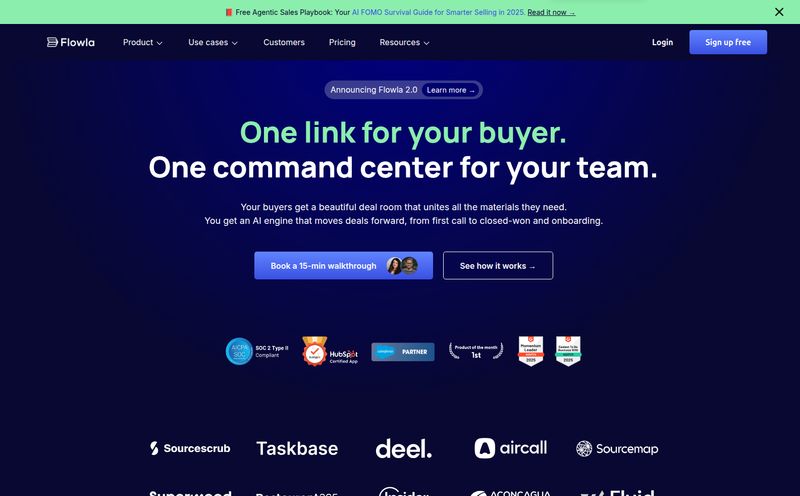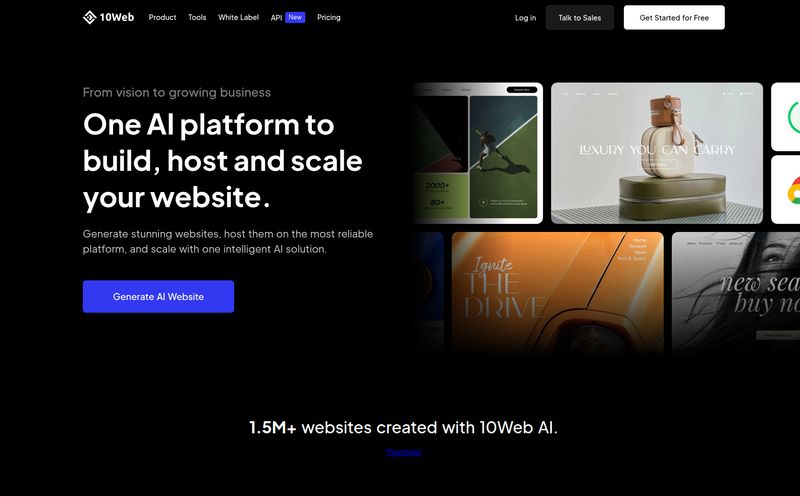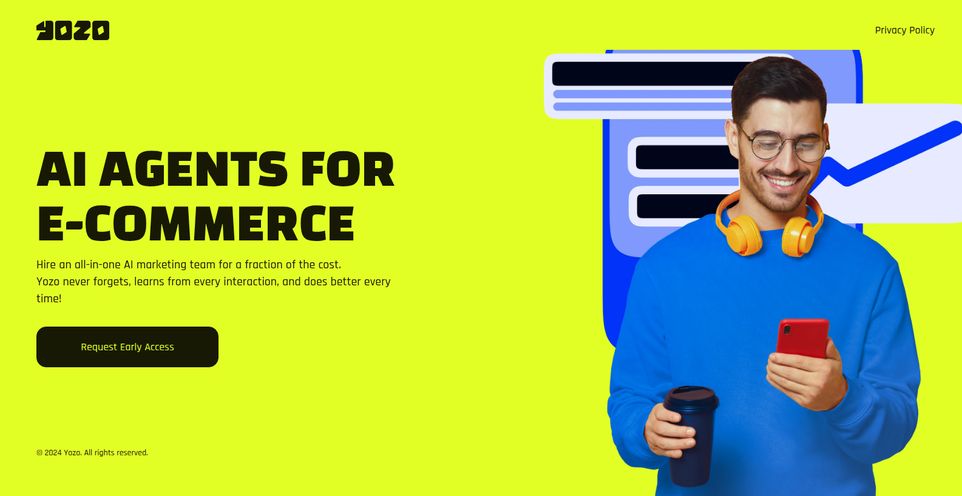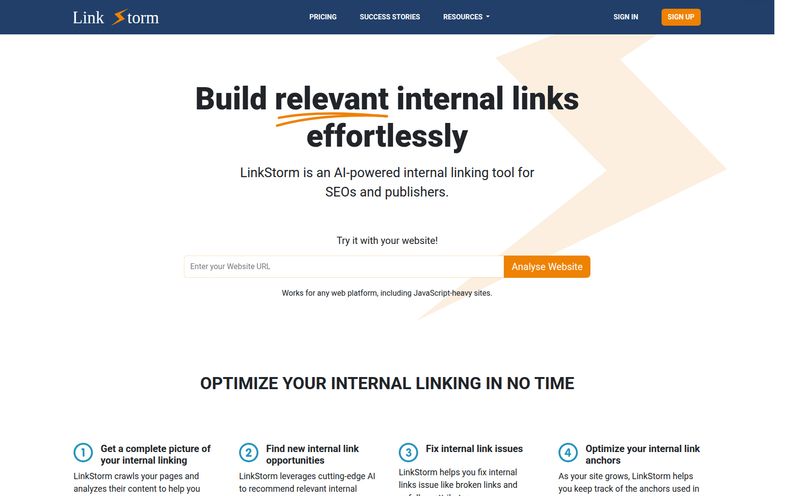If you run a Shopify store and you're dabbling in paid ads, you've met the beast. You know the one. It's called the 'product data feed,' and it's a finicky, time-sucking monster that demands constant attention. I’ve spent more late nights than I care to admit wrestling with spreadsheets, trying to figure out why Google Merchant Center suddenly decided to disapprove half my products for the fifth time this week. It feels like trying to herd a thousand angry cats. Into individual, perfectly labeled boxes.
So, when a tool comes along promising to automate and optimize this whole mess with AI, my ears perk up. But let's be honest, I'm also a little skeptical. We've all seen tools that promise the world and deliver a pamphlet. That’s why I decided to take a proper look at AdNabu, a Shopify app that’s been making some noise in the e-commerce space. Is it just another app, or is it the secret weapon for scaling ads without pulling your hair out? Let’s get into it.
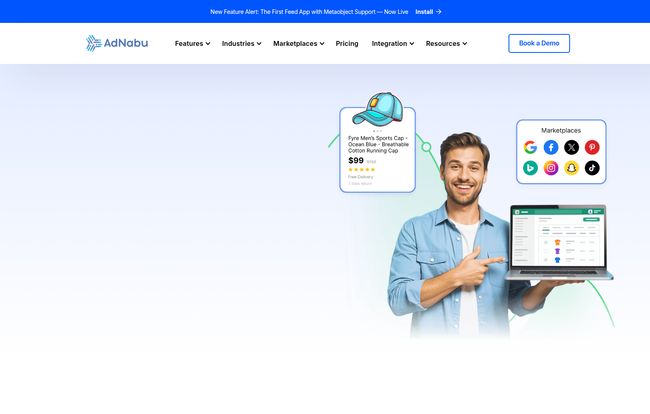
Visit AdNabu
So, What is AdNabu Anyway?
In a nutshell, AdNabu is a product feed management app built specifically for Shopify and Shopify Plus stores. Its entire purpose is to take your product data from your store and format it perfectly for a whole bunch of different advertising channels. We're talking the big players: Google Shopping, Facebook, Instagram, TikTok, Pinterest, Microsoft Bing... you get the idea. It acts as the ultimate translator between your Shopify store and the strict, often confusing, requirements of these platforms.
But it's not just about formatting. It's about optimizing. And that’s where things get interesting.
The Features That Actually Move the Needle
An app can have a million features, but I only care about the ones that save me time or make me more money. Here’s where I think AdNabu really shines.
AI Feed Optimization: Your New Overworked Intern
This is the headline act. AdNabu uses AI to beef up your product titles and descriptions. For example, it can automatically add attributes like color, size, or material to your product titles, which is a known best practice for improving click-through rates on Google Shopping. Think of it like an incredibly fast, smart intern who analyzes your products and rewrites your data for maximum impact. It also provides Google Keyword Suggestions, which helps you align your product listings with what people are actually searching for. No more guessing games.
Spreading Your Wings with Multi-Marketplace Support
Being everywhere your customers are is the name of the game now. AdNabu gets this. The ability to create and manage feeds for Facebook, TikTok, and Pinterest from the same dashboard where you handle your Google feed is a massive time-saver. It ensures your product info is consistent everywhere, which is great for branding and even better for your sanity. It also supports Shopify Markets, so managing multi-language and multi-currency feeds isn’t the technical nightmare it used to be. Huge win for anyone selling internationally.
Taming the Beast: Bulk Editing and Smart Filters
If you have more than a handful of products, editing them one-by-one is a non-starter. AdNabu’s bulk editing is a lifesaver. Need to add a seasonal term to all products in a specific collection? A few clicks and you're done. The smart filters are incredibly powerful, allowing you to create custom rules and segments. For instance, you could exclude low-stock items from your ads automatically or create a special feed for products with 5-star reviews. It’s this kind of granular control that separates the amateur campaigns from the professional ones.
Let's Talk Money: AdNabu's Pricing Plans
Alright, the all-important question: what’s this going to cost? AdNabu has a tiered structure, which I appreciate because you’re not forced into a plan with features you dont need. It seems pretty aligned with a store's growth stages.
| Plan | Price (per month) | Who It's For |
|---|---|---|
| Starter | $0 | New stores just getting started, with up to 50 products. A great way to test the waters. |
| Basic | $29.99 | Growing stores that need unlimited products and access to all the major ad channels (Facebook, TikTok, etc.) and the core AI features. |
| Advanced | $79.99 | Serious advertisers who need more customization with Metafields, product review integrations, and more AI credits. |
| Plus | $249.99 | Large-scale operations and agencies needing priority support, custom features, and a massive amount of AI credits. |
Prices are based on information available at the time of writing. Always check the official AdNabu pricing page for the most current details.
My Honest Take: The Good and The Not-So-Good
No tool is perfect. A balanced review needs to look at both sides of the coin. After playing around with it and digging through its features, here’s my straightforward opinion.
What I Genuinely Like
The biggest pro, for me, is the time savings. The AI-powered optimization is not just a gimmick; it genuinely improves data quality in a fraction of the time it would take a human. The multi-channel support is seamless, and being built specifically for Shopify means the integration is tight. Things like supporting Shopify Flow, Metafields, and even headless setups show that they understand the modern e-commerce stack. It's not just a generic tool with a Shopify connector tacked on. It feels native.
A Few Things to Consider
Of course, there are some trade-offs. The free Starter plan is quite limited at just 50 products. It's more of a demo than a long-term solution for most stores. The real magic, like the full suite of marketplace feeds and advanced AI, starts with the Basic plan. And some of the most powerful features, like product review integrations and deeper customization, are reserved for the higher-tier Advanced plan. You also need to keep an eye on your AI credits, as they are limited based on your plan. This is pretty standard for AI tools, but something to be aware of.
So, Who Is AdNabu Really For?
I see AdNabu as the perfect fit for a few types of Shopify merchants:
- The Growth-Focused Store Owner: You're past the hobby stage and are serious about using paid channels like Google Shopping and Facebook ads to scale. You value your time and would rather spend it on strategy than on spreadsheets.
- The Omnichannel Seller: You want to sell on multiple platforms but are terrified of the administrative overhead. AdNabu centralizes this process beautifully.
- The Tech-Savvy Marketer: You understand the power of high-quality data and want granular control over your feeds without having to write custom scripts.
If you're just starting out with a tiny inventory and no ad budget, the free plan is a nice start. But the real value is unlocked when you're ready to invest in your advertising workflow.
Frequently Asked Questions
Is AdNabu easy to set up for a beginner?
Yes, for the most part. Because it's a Shopify app, the initial installation and sync are very straightforward. There's a learning curve to mastering the more advanced rules and filters, but the basic setup and optimization are quite intuitive. You dont need to be a developer.
Can AdNabu really fix my Google Merchant Center errors?
It can certainly help prevent a lot of them! Many disapprovals come from missing or poorly formatted data (like GTINs, descriptions, or image links). By structuring and enriching your feed correctly before it even gets to Google, AdNabu solves the problem at the source. It makes your feed much cleaner and more compliant, drastically reducing those frustrating error emails.
How is this different from other product feed apps?
In my experience, the key differentiators are its deep, native Shopify integration and the practical application of its AI. It's not just about syntax; the AI suggestions are geared towards actual performance improvements. Support for modern Shopify features like Metaobjects and Headless commerce also puts it a step ahead of some older, more generic tools.
Do I need the Advanced or Plus plan?
For most growing stores, the Basic plan is the sweet spot. You should only consider the Advanced plan if you heavily rely on product reviews to drive sales (the integration is a killer feature) or if you need to customize your feed with data from Shopify Metafields. The Plus plan is for enterprise-level businesses with very specific needs and the budget for priority, hands-on support.
The Final Word on AdNabu
Look, managing product feeds will probably never be the most glamorous part of running an e-commerce business. It's foundational, nitty-gritty work. But tools like AdNabu can transform it from a major time-sink into a strategic advantage. It takes the tedious, repetitive tasks and puts them on autopilot, freeing you up to think about the bigger picture.
It’s not a magic bullet—you still need a good product and a solid ad strategy. But it is an incredibly powerful force multiplier. If you're feeling the pain of manual feed management and want to get more out of your ad spend, I think giving AdNabu a spin is a no-brainer. The time it saves you could very well pay for the subscription in the first month alone.
